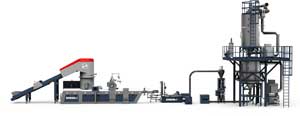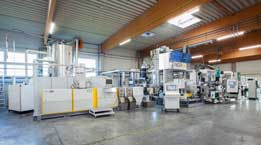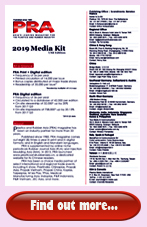PRA Chinese
Rubber Journal Asia Injection Moulding Asia Energy, Oil & Gas Asia
VISIT OUR OTHER SITES:
PRA Chinese
Rubber Journal Asia
Injection Moulding Asia
Energy, Oil & Gas Asia
Recycling at K2019: 100% PCR-HDPE packaging applicable, says Erema; NGR/Kuhne team up to show PET recycling/sheet production line

Austrian recycling machine maker Erema says that the US Food and Drug Administration (FDA) has recently approved the food contact compliance of post consumer recycled HDPE (PCR-HDPE) produced with its patented Intarema TVEplus RegrindPro extrusion system in combination with the ReFresher module. This opens up new opportunities to close the loop in food packaging made of high-density polyethylene (HDPE).
"FDA approval means that new food packaging can contain up to 100% of PCR-HDPE produced using this recycling process," says Clemens Kitzberger, Business Development Manager in the Erema Group for the post consumer sector. The starting material for the PCR-HDPE is a defined post consumer input stream consisting of 99% food containers, i.e. milk and juice bottles. PCR-HDPE produced from this can be processed into bottles, food dishes and similar products. Erema says it achieves the necessary purity of the PCR-HDPE by combining its extrusion system with the ReFresher module, an anti-odour technology.
"The high decontamination performance of our machine is thanks to the pre-treatment of the material during the one-hour dwell time in the preconditioning unit of the recycling extruder and the additional removal of low-volatility odorous substances from the granulate by the ReFresher," says Michael Heitzinger, Managing Director Erema, explaining the quality advantages of this recycling process.
He also adds that the efficiency of the ReFresher was tested and confirmed in a separate challenge test using highly contaminated input material. Because the ReFresher uses the latent energy of the pellets preheated by the extrusion process, this system is also energy-saving, he said.
As early as April, this recycling technology was the decisive factor in Werner & Mertz's joint project with Erema and with the Green Dot to launch the world's first approved shower gel bottle for the cosmetics sector, manufactured with 100% PCR-HDPE collected in yellow household recycling bags.
These and numerous other technical innovations and highlights in the PET, post consumer and in-house recycling areas will be presented by Erema at K2019.

Meanwhile, in other news recycling machine specialist Next Generation Recycling Machines (NGR) and extrusion machinery supplier Kuhne Group are to take their cooperation, first revealed at K2016, to the next step. Since 2016, both companies say several joint projects have been implemented, with the combination of recycling and direct sheet production having intensified since then. Therefore, at K 2019, a demonstration line for viewing direct rPET to sheet has been arranged in Kuhne’s R&D area in nearby St. Augustin.
In-depth tests on pilot plants paired with experience from production plants have shown that a wide variety of PET waste can be processed on such plants: from typical industrial waste such as thermoform skeletons or even fibres - including PETG - to typical post consumer waste such as PET bottle flakes or other PET waste such as flakes from multilayer films (up to 10% foreign polymers). This diversity provides the flexibility required to ensure ample raw material supply on the one hand, and to gain the most value of the raw material on the other.
After melting in the extruder and filtration, the PET melt enters the LSP reactor (LSP = Liquid State Polycondensation) - the technological heart of the line. Here, harmful chemicals are removed far below EFSA and FDA limits and at the same time the IV value (intrinsic viscosity) is boosted to the desired level. The IV which reflects the PET molecular chain length, is automatically controlled within a very narrow tolerance range by the line and thus ensures very uniform, high-strength flat films.
Thermoformers can thus produce thermoformed packaging with uniform and high strength, optical properties and approved for 100% food contact. Due to the physical properties, automatic filling and sealing lines can be operated safely and efficiently, explain the companies. From the consumer’s perspective, the rPET cups have a sturdy feel, high gloss and transparency such that the product is highly preferred against lesser quality reprocessed materials.
"With NGR's recycling solutions, we are trying to strengthen the circular economy and find ways to improve product properties even further compared to conventional processes. The cooperation with KUHNE Group supports us in this very much," says Thomas Pichler, Technical Director and co-owner of NGR.
Rainer Bobowk, Business Unit Manager Smart Sheets at Kuhne, adds: "The PET melt coming from the recycling extruder and through the LSP is seamlessly transferred into the Kuhne sheet line. The T-channel die with internal deckling, specially developed by Kuhne for the production of PET films, distributes the melt into the Smart Sheets calender. Additional functional layers can be added via co-extrusion and a Kuhne multi-layer feed block. Later features such as thickness measurement, a silicone applicator and the final film rewinder complete the system. The rPET films produced in this way are characterised by extremely tight dimensional tolerances and uniform strength with excellent optical properties. The extremely stable operation of the system due to the high and uniform melt quality - otherwise only possible with virgin material - guarantees our customers an extremely high productivity.”
(PRA)
Subscribe to Get the Latest Updates from PRA Please click here
©2019 Plastics and Rubber Asia. All rights reserved.

©2019 Plastics and Rubber Asia. All rights reserved.
Home Terms & Conditions Privacy Policy Webmail Site Map About Us






















